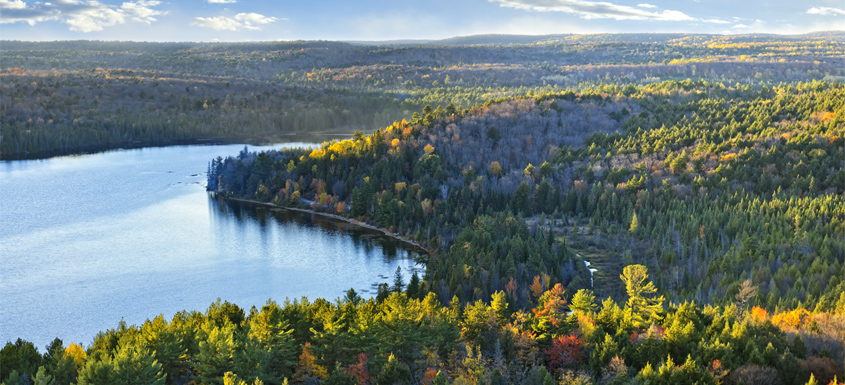The United Nations (UN) has declared March 21 as International Day of Forests. Here are eight reasons why forests are important for our economy, our planet, and society at large.
According to the UN Food and Agriculture Organization (FAO) – forests cover 31% of the planet’s land surface, store an estimated 296 gigatonnes of carbon, and are home to 80% of the world’s terrestrial biodiversity. Forests provide the world with roughly 40% of the current global renewable energy supply, more than solar, hydroelectric, or wind power.
With nearly 40% of our country blanketed by trees, Canada’s forests are one of the world’s most sustainable providers of renewable, reusable, and recyclable forest-based products and materials. Sustainably managed forests in Canada, and the renewable products they provide, are vital to helping us meet the UN’s Sustainable Development Goals (SDGs) while growing our green economy.
Our forests provide products that Canadians can be proud of – knowing that they are responsibly sourced and are making a difference in our collective fight against climate change. As the national voice of Canada’s forest sector and its workers, Forest Products Association of Canada (FPAC) recognizes the UN FAO’s eight reasons why forests and forest products are important for our economy, our planet, and society at large.
1. The global forest sector supports jobs for at least 33 million people, and forest products are used by billions every single day in the form of housing, packaging, pencils, tissue products, books and even nanocellulosic products, to name a few.
It is estimated that more than half the world’s economic production (gross domestic product) depends on ecosystem services, including those provided by forests. In Canada, the forest sector generates family-supporting jobs across the country, including rural and remote communities, mid-sized cities, large urban centres and hundreds of Indigenous communities – providing 225,000 direct jobs and over 600,000 indirect jobs from coast to coast. The forest sector employs a diverse range of professionals including foresters, engineers, mapping specialists, field technicians, biologists, wildlife scientists, harvesters and loggers, truck drivers, tree planters and more.
2. Forests are essential for planetary health and human well-being.
Did you know forests cover nearly one-third of the Earth’s land surface? In Canada and abroad – forests provide people with goods such as timber, fuel, food and fodder, help combat climate change, protect biodiversity, soils, rivers, reservoirs, and serve as areas where people can get close to nature.
3. The sustainable management of forests and use of harvested wood products will help us move to an economy based on renewable, reusable, and recyclable materials.
Almost every part of a harvested tree that is removed from the woods can be used, ensuring minimal waste. Wood can be used for diverse purposes, with lower environmental impacts than many alternative materials. Wood can be reused, and paper can be recycled, thereby extending its life and further reducing its material footprint, while keeping carbon locked up.
4. Expanding the use of forest products contributes to carbon neutrality.
Science and innovation are producing exciting new products from wood and trees, including textiles, foods, construction materials, cosmetics, biochemicals, bioplastics, and medicines. Replacing less-sustainable materials with renewable wood and tree-based products can reduce the carbon footprint.
From building taller with carbon-storing wood, to using wood waste to make innovations like the world’s first Made-in-Canada biodegradable face mask, our sector has the potential to make Canada a leader in a growing, green, global economy.
5. Sustainable wood is an essential material for greening cities.
The building and construction sector is responsible for almost 40% of energy-related greenhouse gas emissions globally. Innovation is making it feasible to use more wood in tall buildings and other infrastructure – helping us green our cities because wood stores carbon, requires less energy to produce than many other construction materials, and provides good insulation.
Mass timber construction is taking root in many of Canada’s cities with over 900 wood building projects currently completed, underway, or planned. The University of British Columbia’s Brock Commons, George Brown College’s Limberlost Place, and Quebec City’s Origine are just a few of the signature projects popping up across Canadian city skylines. The global market for mass timber buildings is expected to surpass $16 trillion by 2025 and there is growing opportunity for Canada to be a leader in this space.
6. Forests are vital for sustaining food production.
Forest ecosystem services – such as the maintenance of biodiversity, climate regulation, water and soil quality, and pollination – are essential for sustainable agrifood systems and feeding a growing global population. In addition, more than three-quarters of rural households worldwide are estimated to harvest wild foods from forests and other environments.
7. More action is needed to halt deforestation and degradation.
In Canada, sustainability is the law. We harvest less than 0.5% of our harvestable forests each year, and plant 400-600 million seedlings every year to keep our forests as forests forever. Canada has retained more than 90% of its original forest cover – and has about 9,000 trees for every single Canadian. While our rules, regulations, and policies are among the most stringent in the world – the planet at large has lost 420 million hectares of forest since 1990 and deforestation continues at about 10 million hectares per year, due mainly to agricultural expansion. Managing forests sustainably can help reduce deforestation and degradation, restore degraded landscapes, and provide people with jobs and renewable materials. Many forestry companies set aside land that is reserved for biodiversity conservation.
8. Choose wood products from legal and sustainable sources.
Consumers can contribute to the sustainable use of forests by choosing wood products with labelling or certification confirming that they come from legal and sustainable sources. Learn more about the internationally recognized sustainable forest management certification standards in Canada.
On International Day of Forests, it’s important to recognize the Canadians who work every day to keep our forests healthy for generations to come, how our forests are a critical resource in our collective fight against climate change, and how our forests provide real environmental benefits along with family-supporting jobs for hundreds of thousands of workers in rural, northern, and Indigenous communities across our country.
Happy International Day of Forests, Canada!
Are you a student or young researcher interested in the future of forest-based innovation? Learn about our Chisholm Awards for Innovation in Forestry here.
ABOUT INTERNATIONAL DAY OF FORESTS
The United Nations General Assembly proclaimed 21 March the International Day of Forests (IDF) in 2012. The Day celebrates and raises awareness of the importance of all types of forests. On each International Day of Forests, countries are encouraged to undertake local, national and international efforts to organize activities involving forests and trees, such as tree planting campaigns. The theme for each International Day of Forests is chosen by the Collaborative Partnership on Forests: https://www.fao.org/forests/en/
Source: FPAC













